Best Vitamin A Supplements of 2023
Vitamin A plays an important role in supporting the immune system, regulating gene function and producing health red blood cells. Most importantly perhaps, it is crucial to the maintenance of good eyesight. Indeed one of the hallmarks of vitamin A deficiency is increased risk of night blindness.
Night blindness is defined as a reduced ability to see things in low light conditions. This occurs because the nerve impulses in our brain that interpret visual information depend on vitamin A to function properly.
Below are the 10 best vitamin A supplements for 2023.
1. Now Foods Vitamin A
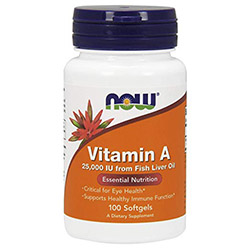
Now Foods Vitamin A is gleaned from cod liver oil and refined to a high degree of purity. Each of these softgel capsules contain 25,000 iu of vitamin A which makes it ideal for those seeking to reverse a deficiency. Now Foods Vitamin A contains no gluten, shellfish or dairy and no yeast that may cause allergic reactions. Like all Now Foods supplements this one is produced in their GMP certified facility. This supplement is the best on the market today.
2. Solgar – Dry Vitamin A 5000 IU
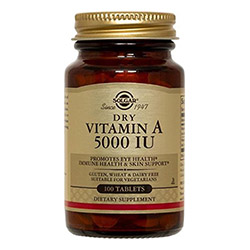
Solgar produce some of the finest dietary antioxidant supplements available today. Their Dry Vitamin A is well tolerated by those who may find oil based supplements objectionable. Each Solgar Dry Vitamin A tablet contains 5,000 iu of vitamin A, an ideal amount for those who are not suffering from an acute deficiency, but who believe they are not getting enough of this essential vitamin in their normal diet.
3. Country Life Dry Vitamin A Tablets
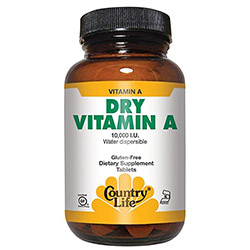
For many people vitamin A must be taken in a ‘dry’ form in order to be absorbed properly. For such individuals Country Life Dry Vitamin A Tablets are the answer. Each one contains 10,000 iu of vitamin A to help fight the scourge of free radicals, improve your vision and maintain healthy blood supply. Country Life Dry Vitamin A Tablets are certified vegan as well as being gluten, soy, sodium and sugar free.
4. Bronson Vitamin A GMO-Free Formula
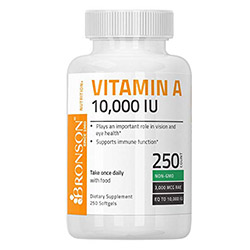
For those concerned over the inclusion of synthetically produced vitamins in their supplements Bronson provides this high quality GMO-free vitamin A. GMO stands for Genetically Modified Organism and whether such things actually constitute a health risk is open for debate. But if you believe it’s a potential issue Bronson Vitamin A GMO-Free is here to help. Each softgel capsule contains 10,000 iu of GMO-free vitamin A and is produced in FDA certified labs.
5. Nature’s Way Vitamin A Softgels
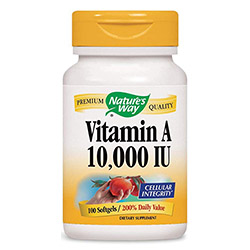
Nature’s Way Vitamin A Softgels contain highly purified cod liver oil which is one of the most effective sources of vitamin A. They are sugar, sodium, wheat, dairy and gluten free and contain no preservatives artificial colors or artificial flavors. Nature’s Way produces all their supplements in their GMP (Good Manufacturing Practices) certified lab and are known for their rigorous quality control standards and the efficacy of their products.
6. Natural Nutra Vitamin A
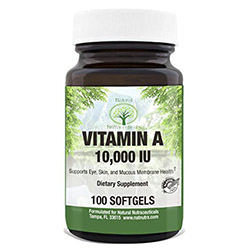
Natural Nutra goes to great lengths to ensure the purity of their product. They produce all their supplements in their GMP lab and use only BPA free bottles as containers. Each bottle is clearly marked with ‘best when used by’ date and the supplements themselves are contained in heat sealed sleeves. Natural Nutra source their vitamin A from cod liver oil, which is easily absorbed by the system, and each capsule is gluten, dairy and yeast free.
7. Bluebonnet Vitamin A
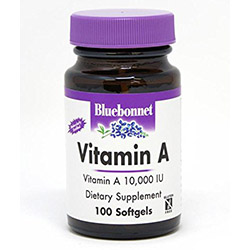
Like most high quality ‘wet’ vitamin A supplements this one from Bluebonnet is gleaned from cod liver oil. Bluebonnet refine their product to an almost obsessive degree so that when ingested it is absorbed by the body as quickly and efficiently as possible. Bluebonnet Vitamin A is completely free of peanuts and tree nuts (which often cause allergic reactions) as well as being dairy, wheat and shellfish free.
8. Vital Nutrients Vitamin A
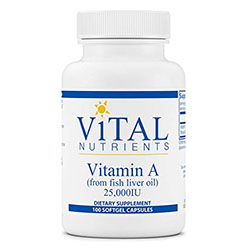
Vital Nutrients Vitamin A is obtained from cod liver oil and rich in beneficial antioxidants. It is absorbed quickly by the body and sets right to work enabling healthy red blood cells and enhanced nervous system function. At 25,000 iu per capsule this particular supplement is probably best advised for those with a known or suspected vitamin A deficiency. No binders are used and the capsules are free of dairy products, sugar and gluten.
9. Thorne Research Vitamin A
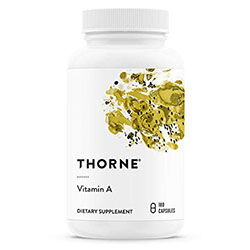
Vitamin A is often sourced from animal products which makes it difficult for non-meat eaters to obtain enough either in their diet or by way of supplements. Thorne Research vitamin A is drawn from vegetables and augmented by a synthetically produced form of the vitamin. The result is this 25,000 iu supplement that is safe for vegans and completely free of gluten, soy, dairy, shellfish and yeast.
10. Source Naturals Vitamin A
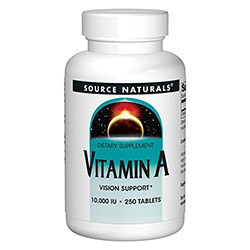
Source Naturals Vitamin A is gleaned from vegetable sources and is guaranteed to be yeast, dairy, gluten and preservative free. Those vegetable sources are augmented by synthetically produced vitamin A to create a supplement of extraordinary purity and effectiveness. Whether you are vegan or simply wish to partake of one of the most effective vitamin A supplements available today you’ll appreciate Source Naturals Vitamin A.
FAQs
What Does Vitamin A Do?
Vitamin A is a crucial nutrient that plays various roles in the body. Here are some key functions and benefits of vitamin A:
- Vision: Vitamin A is essential for maintaining good vision. It is a component of a pigment called rhodopsin, which is present in the retina of the eye. Rhodopsin is necessary for vision in low-light conditions, and vitamin A helps support the production and functioning of this pigment. It also helps prevent conditions like night blindness and age-related macular degeneration.
- Immune Function: Vitamin A plays a vital role in supporting a healthy immune system. It helps maintain the integrity and function of the skin and mucous membranes, which act as barriers against pathogens. It also promotes the growth and development of immune cells, enhances the immune response to infections, and supports the production of antibodies.
- Cell Growth and Differentiation: Vitamin A is involved in the growth and differentiation of cells in various tissues and organs. It supports the normal development and maintenance of healthy tissues, such as those in the skin, respiratory system, digestive system, and reproductive system. It also plays a role in the growth and repair of bones and teeth.
- Skin Health: Vitamin A contributes to healthy skin by promoting the production of collagen, a protein that gives structure and elasticity to the skin. It supports the growth and repair of skin cells, helps prevent dryness and flakiness, and may assist in managing certain skin conditions, such as acne and psoriasis.
- Antioxidant Activity: As an antioxidant, vitamin A helps protect the body’s cells from damage caused by harmful free radicals. It neutralizes these unstable molecules, reducing oxidative stress and the risk of chronic diseases associated with it, including heart disease, cancer, and aging-related conditions.
- Reproductive Health: Vitamin A is important for reproductive health in both males and females. In males, it is necessary for the production and maturation of sperm. In females, vitamin A supports normal fetal development during pregnancy and is essential for the healthy growth and functioning of the placenta.
It’s worth noting that vitamin A comes in different forms, including retinol (preformed vitamin A found in animal sources) and carotenoids (provitamin A found in plant sources). These forms are converted into the active form of vitamin A, retinoic acid, as needed by the body.
What are the Benefits of Vitamin A?
Vitamin A is known to be important to proper vision with night blindness (1) being a common symptom of a vitamin A deficiency. But vitamin A is also a vitally important antioxidant that plays a front-line role in fighting free radicals, maintaining cardiopulmonary health and preventing renal failure. Vitamin A also enables a healthy immune system (2) by promoting the proliferation of T cells. And it is important for healthy skin, with certain medications containing vitamin A thought to be effective in treating acne and other skin conditions.
What is the Recommended Daily Intake of Vitamin A?
The recommended daily intake of vitamin A varies depending on factors such as age, sex, and life stage. The following are the Recommended Dietary Allowances (RDAs) for vitamin A:
- Infants (0-6 months): 400 micrograms (mcg) or 1,333 International Units (IU)
- Infants (7-12 months): 500 mcg or 1,667 IU
- Children (1-3 years): 300 mcg or 1,000 IU
- Children (4-8 years): 400 mcg or 1,333 IU
- Children (9-13 years): 600 mcg or 2,000 IU
- Males (14 years and older): 900 mcg or 3,000 IU
- Females (14 years and older): 700 mcg or 2,333 IU
- Pregnant females: 770 mcg or 2,567 IU
- Breastfeeding females: 1,300 mcg or 4,333 IU
It’s important to note that these recommendations are for total vitamin A intake, which includes both preformed vitamin A and carotenoids (retinol) from animal sources and provitamin A carotenoids (such as beta-carotene) from plant sources. The body can convert provitamin A carotenoids into vitamin A as needed.
It’s generally recommended to obtain vitamin A from a balanced diet that includes a variety of fruits, vegetables, and animal-based foods. If you’re considering taking a vitamin A supplement, it’s best to consult with a healthcare professional who can assess your individual needs and provide personalized recommendations regarding dosage and supplementation.
Who Should Take Vitamin A?
While Vitamin A supplements aren’t necessarily for everyone there are some folks who should strongly consider taking supplemental vitamin A on a regular basis. These include:
- Seniors – Free radicals work tirelessly to undermine cellular health and this expresses itself in any number of ways as we age. Antioxidants like vitamin A are known to do battle with free radicals (3) and play a major role in helping us maintain healthier skin and more robust organ function as we age. Of course vitamin A also helps slow various degenerative eye conditions that commonly beset the elderly.
- People with compromised immune systems – Vitamin A is known to promote a healthy immune system by, as we said above, promoting the proliferation of T cells. Its antioxidant properties also help it fight off free radicals that can attack the cells in our organs and diminish their effectiveness. It also possesses anti-inflammatory properties which facilitate its ability to bolster the immune system.
- Those with IBD – Inflammatory Bowel Disease is a blanket term for a group of vexing conditions that afflict the digestive tract. Crohn’s disease, ulcerative colitis and irritable bowel syndrome are perhaps the best known of these conditions. Because of its anti-inflammatory capabilities vitamin A is known to aid in mitigating some of the worst aspects of these maladies (4). As a result nutrients are processed by the body more effectively and that helps stave off other potential problems.
- People with acne – Acne has been a thorn in the side of the medical community for centuries. It’s a common condition that seems to defy effective solutions. Pores become clogged, the surface of the skin becomes disfigured and scarification is common. It is believed that vitamin A can help reduce the effects of acne (5), although quantifying any benefit is difficult. After all how can you measure what doesn’t happen?
Why Should I take Vitamin A?
- Vitamin A is an essential nutrient that plays a crucial role in maintaining the overall health of your body. Here are some reasons why you might consider taking a vitamin A supplement:
- Vision Health: Vitamin A is necessary for good vision, especially in low-light conditions. It helps maintain the health of your eyes, promotes night vision, and reduces the risk of certain eye conditions like night blindness and age-related macular degeneration.
- Immune Function: Vitamin A is important for a well-functioning immune system. It supports the growth and development of immune cells, helps maintain the integrity of your skin and mucous membranes (your body’s first line of defense against pathogens), and enhances the immune response to infections.
- Skin Health: Adequate levels of vitamin A are essential for healthy skin. It promotes the production of collagen, a protein that gives structure and elasticity to your skin. Vitamin A also supports the growth and repair of skin cells, helps prevent dryness and flakiness, and may even help reduce acne symptoms.
- Growth and Development: Vitamin A is crucial for normal growth and development, especially in children. It supports bone growth, tooth development, and reproductive health. It also plays a role in the development and maintenance of healthy tissues, such as those in the respiratory, digestive, and urinary systems.
- Antioxidant Activity: As an antioxidant, vitamin A helps protect your cells from damage caused by harmful free radicals. It neutralizes these unstable molecules and reduces oxidative stress, which is associated with various chronic diseases, including heart disease, cancer, and aging-related conditions.
While vitamin A can be obtained from a well-balanced diet that includes sources like liver, eggs, dairy products, and colorful fruits and vegetables, some individuals may have a deficiency or have specific needs that require additional supplementation. If you’re considering taking a vitamin A supplement, it’s best to consult with a healthcare professional who can assess your individual needs and recommend the appropriate dosage.
What is Vitamin A Palmitate?
Vitamin A palmitate is a form of vitamin A that is commonly used in dietary supplements and fortified foods. It is a synthetic version of vitamin A that combines retinol (the active form of vitamin A) with palmitic acid. This combination allows for better stability and shelf life of the vitamin A compound.
Vitamin A palmitate is easily converted by the body into retinol, which is the form of vitamin A that can be utilized by the cells. Once converted, retinol plays a crucial role in various biological functions, including vision, immune function, cell growth and differentiation, and maintaining the health of the skin and mucous membranes.
Vitamin A palmitate is often added to foods, such as dairy products, breakfast cereals, and margarine, as a means of fortification to help increase the vitamin A content. It is also used in multivitamin supplements and standalone vitamin A supplements.
It’s important to note that vitamin A palmitate should be consumed in moderation and in accordance with the recommended daily intake guidelines. Excessive intake of vitamin A, including vitamin A palmitate supplements, can lead to vitamin A toxicity, as discussed earlier. It’s always a good idea to consult with a healthcare professional or a registered dietitian before starting any new supplements or significantly increasing your vitamin A intake.
Can Vitamin A Be Used to Treat Acne?
Vitamin A, specifically in the form of retinoids, has been used in the treatment of acne. Retinoids are derivatives of vitamin A that can be applied topically or taken orally as prescribed by a healthcare professional.
Here’s how vitamin A can help with acne:
- Regulation of Skin Cell Turnover: Retinoids can help regulate the turnover of skin cells, preventing the buildup of dead skin cells that can clog pores and contribute to acne formation. By promoting the shedding of dead skin cells, retinoids can help keep the pores clear and prevent the formation of comedones (clogged pores).
- Reduction of Inflammation: Vitamin A derivatives have anti-inflammatory properties that can help reduce redness, swelling, and inflammation associated with acne lesions. They can also inhibit the production of certain inflammatory chemicals in the skin.
- Decreased Sebum Production: Retinoids can help reduce the production of sebum, the oily substance that can contribute to the development of acne. By regulating sebum production, vitamin A derivatives can help prevent the clogging of pores and the formation of acne lesions.
It’s important to note that the use of vitamin A for acne treatment should be done under the guidance of a healthcare professional. They can prescribe appropriate forms and dosages of vitamin A, such as topical retinoids like tretinoin or oral retinoids like isotretinoin, based on the severity of the acne and individual factors.
Furthermore, it’s worth mentioning that some people may experience temporary skin dryness, redness, or irritation when using vitamin A derivatives. It’s important to follow the instructions provided by the healthcare professional and use any prescribed treatments as directed.
Is Vitamin A Good for Skin?
Vitamin A is beneficial for skin health and is commonly used in skincare products and treatments. Here are some ways in which vitamin A can benefit the skin:
- Skin Cell Renewal: Vitamin A promotes the turnover of skin cells, helping to shed dead skin cells and reveal fresher, healthier skin. This process can improve skin texture, smoothness, and overall complexion.
- Wrinkle Reduction: Vitamin A derivatives, such as retinoids, have been shown to reduce the appearance of fine lines and wrinkles. They can stimulate collagen production, which helps improve skin elasticity and firmness.
- Acne Treatment: As mentioned earlier, vitamin A derivatives can be effective in treating acne by regulating sebum production, reducing inflammation, and preventing clogged pores. They can help minimize acne breakouts and improve the overall appearance of the skin.
- Even Skin Tone: Vitamin A can help even out skin tone and reduce the appearance of hyperpigmentation, dark spots, and sun damage. It inhibits the production of melanin, the pigment responsible for skin coloration, and can help fade discolorations over time.
- Skin Health Maintenance: Vitamin A supports the health and integrity of the skin barrier. It helps keep the skin hydrated, improves moisture retention, and protects against environmental damage. This can result in a smoother, healthier-looking complexion.
When using vitamin A for skincare, it’s important to choose the right form and concentration for your skin type and needs. Some individuals may benefit from over-the-counter retinol creams or serums, while others may require prescription-strength retinoids.
It’s worth noting that vitamin A derivatives can cause skin sensitivity, dryness, and irritation, especially during the initial stages of use. It’s advisable to start with a lower concentration, gradually increase usage, and follow the instructions provided by skincare professionals or product labels. Additionally, using sunscreen during the day is essential when using vitamin A products, as they can increase skin sensitivity to the sun.
Can you Overdose on Vitamin A?
Yes, it is possible to overdose on vitamin A, and excessive intake of vitamin A can lead to toxicity. Vitamin A toxicity, also known as hypervitaminosis A, can occur from consuming very high doses of vitamin A supplements or regularly consuming large amounts of foods rich in vitamin A over a prolonged period.
Symptoms of vitamin A toxicity can include:
- Nausea and vomiting
- Headache
- Dizziness
- Blurred or double vision
- Dry, itchy, and peeling skin
- Hair loss
- Bone and joint pain
- Fatigue and weakness
- Abnormal liver function
- Changes in menstrual cycle (in women)
Severe cases of vitamin A toxicity can lead to more serious complications, such as liver damage, increased pressure within the skull (intracranial hypertension), and higher risk of birth defects if excessive vitamin A is consumed during pregnancy.
It’s important to note that vitamin A toxicity is rare and more likely to occur from high-dose supplementation rather than dietary intake alone. The recommended daily intake (RDI) for vitamin A varies based on age, sex, and life stage, and it is generally safe to obtain vitamin A from a well-balanced diet.
If you suspect vitamin A toxicity or experience any symptoms of overdose, it is crucial to seek medical attention promptly. A healthcare professional can evaluate your symptoms, assess your vitamin A intake, and provide appropriate guidance and treatment if necessary.
Are Sweet Potatoes a Good Source of Vitamin A?
Yes, sweet potatoes are an excellent source of vitamin A. They contain high levels of beta-carotene, which is a provitamin A carotenoid that the body converts into vitamin A as needed. In fact, sweet potatoes are one of the richest sources of dietary beta-carotene.
The orange-fleshed varieties of sweet potatoes tend to have higher beta-carotene content than other varieties. Consuming just one medium-sized sweet potato can provide well over the recommended daily intake of vitamin A for most individuals.
In addition to vitamin A, sweet potatoes also offer other important nutrients such as dietary fiber, vitamin C, potassium, and antioxidants. They are a nutritious and versatile vegetable that can be enjoyed in various dishes, including roasted, baked, mashed, or added to soups and stews.
Incorporating sweet potatoes into your diet can contribute to meeting your vitamin A requirements and provide other health benefits associated with their nutrient content.
Are There Any Risks Involved with Taking Vitamin A?
It is almost unheard of for vitamin A supplementation to produce negative side effects. Still, on a theoretical basis it is possible (6) no matter how unlikely. Should a person actually manage to consume toxic levels of vitamin A they may display symptoms that make them think they are suffering from the flu. They’ll feel achy and tired. Perhaps nauseous. Or they may experience swollen joints and an overall sense of stiffness when they first awaken. If a person somehow manages to consume the necessary amounts of vitamin A to trigger these side effects they can easily reverse the situation by simply taking no more vitamin A until the symptoms subside. After that they should consult their doctor before they begin taking too much vitamin A again.
What Foods Are High In Vitamin A?
There are several foods that are excellent sources of vitamin A. Here are some examples:
- Animal Sources:
- Liver (beef, chicken, pork): Liver is one of the richest sources of vitamin A.
- Fish (salmon, mackerel, trout): Certain fatty fish contain vitamin A.
- Dairy products (milk, cheese, butter): These often contain vitamin A, especially in the form of retinol.
- Plant Sources:
- Sweet potatoes: One medium-sized sweet potato can provide more than the daily recommended amount of vitamin A.
- Carrots: Carrots are well-known for their high beta-carotene content, which the body can convert into vitamin A.
- Leafy green vegetables: Spinach, kale, and collard greens are good sources of provitamin A carotenoids.
- Winter squash: Butternut squash and pumpkin are rich in vitamin A.
- Mangoes: These tropical fruits are packed with beta-carotene and vitamin A.
- Apricots: Dried apricots are particularly concentrated in vitamin A.
These are just a few examples, and there are other fruits, vegetables, and fortified food products that can contribute to your vitamin A intake. Remember that a balanced diet that includes a variety of colorful fruits and vegetables is generally the best way to ensure adequate vitamin A intake, as well as adequate intake of other essential nutrients.
Are There Any Beneficial Vitamin A Stacks?
A “stack” is when a person takes a combination of supplements in the belief that taking certain ones together enables a more beneficial result from each. It’s a matter of the total being greater than the sum of the individual parts. As far as vitamin A is concerned clinical data on stacking is lean to say the least.
It is believed by many, however, that stacking and absorb vitamin A with vitamins C and E along with the mineral zinc can help reduce the effects of macular degeneration as we age. But while it is likely a good idea to take vitamin A to fight off macular degeneration the jury is still out on whether stacking up only vitamin A with these other vitamins and minerals has any added beneficial effect.
What Should I Look For When Choosing a Vitamin A Supplement?
Finding high-quality supplements isn’t always as easy as it may sound. First of all because everyone wants you to believe they are the best and second because some companies are more willing than others to conceal aspects of their supplement that they know some people might object to, such as fillers, allergens and the like. As such there are a few things that will help you ensure you are purchasing a quality product.
- Select a Reliable Brand – A brand name product, one produced for many years with countless satisfied customers, is a good place to start when searching for reliable supplements. Choosing a company you never heard of just because they offer their product at a huge discount is a huge risk.
- Read the Label – Even vitamin A supplements sold online display labels. If they don’t then don’t buy them. If they do, then read them carefully. Look for ingredients you may have an allergic reaction to like peanuts, or things you try to avoid consuming like artificial colors or flavors. The label is as close as you can come to a test drive for supplements. So take advantage of it.
- Is it Wet or Dry Vitamin A? – Vitamin A is not something everyone can readily absorb. Some people need to take it in dry form in order to obtain the desired benefits while others can take it either as a dry tablet or as an oil based gelcap. Which one are you? If you’re not sure ask your doctor.
- Check the Dosage – If you are simply taking supplemental vitamin A to stave off problems chances are you won’t need more the 5,000 iu (7) per day. If, however, you are taking vitamin A to combat a deficiency you may need to take 25,000 iu per day, or perhaps even more. Consult your doctor before taking any type of supplement in large quantities. It may be unnecessary.
What Is Vitamin A Toxicity?
Vitamin A toxicity, also known as hypervitaminosis A, occurs when there is an excessive accumulation of vitamin A in the body. This can happen from consuming extremely high doses of vitamin A supplements or by regularly consuming large amounts of foods high in vitamin A over an extended period.
Symptoms of vitamin A toxicity can vary depending on the severity and duration of the excess intake. Some common signs and symptoms include:
- Nausea and vomiting
- Headache
- Dizziness
- Blurred or double vision
- Dry, itchy, and peeling skin
- Hair loss
- Bone and joint pain
- Fatigue and weakness
- Abnormal liver function
- Changes in menstrual cycle (in women)
Severe cases of vitamin A toxicity can lead to more serious complications, including liver damage, increased pressure within the skull (intracranial hypertension), and birth defects if excessive vitamin A is consumed during pregnancy.
It’s important to note that vitamin A toxicity is rare and is more likely to occur from a high dose vitamin a-dose supplementation rather than dietary intake alone. The recommended daily intake (RDI) for vitamin A varies based on age, sex, and life stage, and it’s generally safe to obtain vitamin A from a well-balanced diet.
If you suspect vitamin A toxicity or experience any of the symptoms mentioned above, it’s essential to seek medical attention promptly. Your healthcare provider can evaluate your symptoms, assess your vitamin A intake, and provide appropriate guidance and treatment if necessary.
How Much Vitamin A Is In Beef?
Beef is not a significant source of vitamin A compared to other foods like liver or certain fish. The vitamin A content in beef is relatively low compared to its other nutritional components. However, here are approximate values for the vitamin A content in beef:
- 100 grams (3.5 ounces) of cooked beef (various cuts): Around 4-5 micrograms of vitamin A
It’s important to note that the vitamin A content in beef can vary depending on factors such as the specific cut of meat, the animal’s diet, and cooking methods. Additionally, the vitamin A in beef is primarily present in the form of retinol, which is the preformed vitamin A found in animal sources.
If you are looking to increase your vitamin A intake, other food sources such as liver, fish (particularly fatty fish like salmon and mackerel), dairy products, and certain fruits and vegetables (e.g., sweet potatoes, carrots, spinach) are generally more significant sources of this vitamin.
Vitamin A Oil
Vitamin A oil, also known as retinol oil, is a skincare product that contains a concentrated form of vitamin A. It is typically used topically on the skin for its potential benefits in improving skin health and addressing various skin concerns.
Vitamin A oil, specifically retinol oil, is commonly used for its potential anti-aging effects. It is believed to stimulate collagen production, improve skin elasticity, reduce the appearance of wrinkles, and promote a smoother and more youthful complexion.
When applied to the skin, vitamin A oil is also thought to promote cell turnover, helping to exfoliate dead skin cells and unclog pores. This can be beneficial for addressing acne, reducing the appearance of acne scars, and improving overall skin texture and clarity.
It’s important to note that vitamin A oil, particularly higher concentrations of retinol, can be quite potent and may cause skin sensitivity, redness, dryness, or irritation, especially during the initial stages of use. It is recommended to start with a lower concentration and gradually increase usage as tolerated. It’s also important to follow the instructions provided by skincare professionals or product labels.
If you are considering using vitamin A oil or any retinol-based product, it is advisable to consult with a dermatologist or skincare professional. They can provide guidance on the appropriate concentration and usage, as well as any precautions or recommendations specific to your skin type and concerns.
The Bottom Line
Vitamin A is one of the unsung heroes of the vitamin world. Without enough of it we’d have a hard time warding off infections, it would take us longer to recover from the common cold or flu, we might suffer skin problems that defy treatment and, of course, our eyesight might fall victim to a rash of degenerative conditions. Vitamin A intake then is not something that should be overlooked. If you feel your diet may not be supplying you with adequate levels of vitamin A talk to your doctor about whether or not you should start taking vitamin A supplements. It’s not too late to start seeing and feeling better.


1 Comment
Vitamin A Supplements Review For 2019 - TheForBiz - Change Your World · February 25, 2019 at 5:17 pm
[…] See More […]